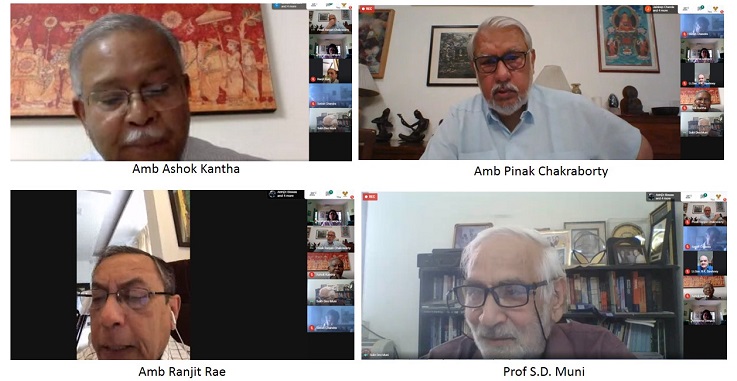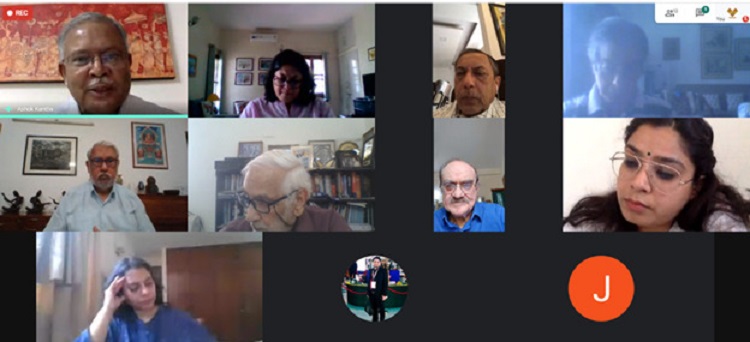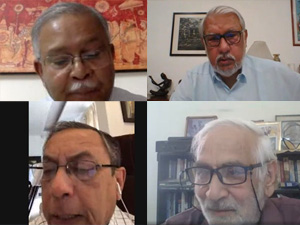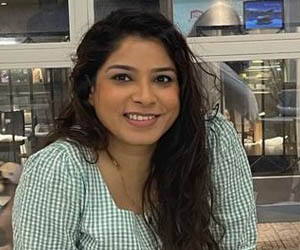Vivekananda International Foundation (VIF) organised a Round Table Discussion (RTD) on ‘Post COVID-19: India and the Neighbourhood’ on 11 May 2020. Amb Satish Chandra, Vice Chairman VIF, delivered the opening remarks followed with presentations by Amb Ranjit Rae, Amb Ashok Kantha, Amb Pinak Ranjan Chakraborty and Prof S.D. Muni. From VIF, Gen Ravi Sawhney, Dr Sreeradha Datta, Col Jaideep Chanda attended the RTD. The RTD was an attempt to reflect on India’s position and role in the South Asian region Post COVID-19 scenario. Amb Satish Chandra in his initial remarks threw light on India’s efforts in helping the neighbours in these times of socio-economic distress due to COVID-19. Prime Minister Narendra Modi’s initiative to collectively call a virtual SAARC meeting was hailed as a step in the positive direction, and reiterated by Ambassadors in the discussion.
There was a collective concern that the South Asian countries are facing a catastrophe, due to its population size and poor public health infrastructure. The initial curve of the slow growth of coronavirus cases has started to rise, especially in countries like India, Pakistan and Bangladesh. The ‘economic disruptions’ have become the ‘new normal’ as various sectors such as the tourism industry of Nepal and the garment industry of Bangladesh are adversely hit. The countries, which are heavily dependent on the remittances, face the challenge with the workers and labourers returning. The influx of labour is a cause of concern, and it is advised to create work opportunities for the returnee labour so that there are no livelihood distresses.

The political developments in Nepal and Bangladesh were reviewed. The increasing impact of the Chinese Government in the domestic politics of Nepal is a cause for concern. In Bangladesh, there have been political disruptions by the religious clergies in dealing with the COVID situation. The recent incident at the Nathu La in Sikkim and eastern Ladakh by the Chinese soldiers transgressing the Indian boundaries were issues that were underlined. The discussion exposed China’s assertiveness in the past few years, which was further heightened with President Xi Jinping coming to power in 2012. The medical diplomacy adopted by China has been seen in both positive and negative light, where the spread of the virus from its territory has led to devastating effects across the world. Furthermore, China’s exports recorded growth in April 2020 despite the world countries facing a downturn.
In this background, the need to resolve the existing bilateral issues within the neighbourhood was underlined. Issues mentioned were the Kalapani territory dispute with Nepal, the fishermen issue with Sri Lanka and the Teesta river dispute with Bangladesh. The discussion debated the anti-Indian sentiments in the region due to past experiences. However, it was recommended that one need not be paranoid about these anti-Indian sentiments, and all actions of the neighbours must not be seen from this perspective.
The shared concerns on limited health infrastructure in the region were stressed. The discussion emphasised on the need to cooperate in production and supply of essential medical equipment such as facemasks, ventilators and the like, in these times of crises. For example, collaboration with Bangladesh pharmaceuticals sector to make vaccines. The discussion proposed the need to set up a ‘Regional Surveillance System’ to generate information and give access to neighbours.

To share the experiences and the lessons learnt, there was a call to initiate the virtual meetings at other platforms as well, like BBIN and promote interactions among Ministry of Finance, Health, Tourism and others. India’s medical diplomacy in terms of providing hydroxychloroquine to SAARC countries was also highlighted. New areas of cooperation were mentioned, for example, exploring the digital space in fields of medical training, education and tourism.
Since the South Asian neighbourhood is similarly impacted, the need for greater and better quality engagements was advocated. The establishment of SAARC COVID-19 Fund is considered an essential step to collect finances in the times of the crises. Nevertheless, there is a need to follow up and ensure its implementation. The initiation of small projects, which produce quick results and low gestation periods, was proposed as an immediate solution to revive economies. There was a collective call to open land borders, as trade processes are considered crucial. Some of the measures suggested to boost trade were to grant duty-free access, reduce the cost of transportation and increase private investments.
Amb Satish Chandra made the concluding remarks with the necessity to run a ‘mission’ to build up good relations with the neighbours. The role of ‘Special Envoys’ as well as the need for multiple layers of engagements like the diplomats and other officials was stressed to ensure conversations continue. The role of think tanks like VIF to involve in meaningful virtual dialogues between neighbourhoods was also recommended. The discussion concluded on a realistic mode that the Post COVID world is years away and not just weeks or months and we need to work on ‘Relief, Rehabilitation and Regeneration’.








Post new comment